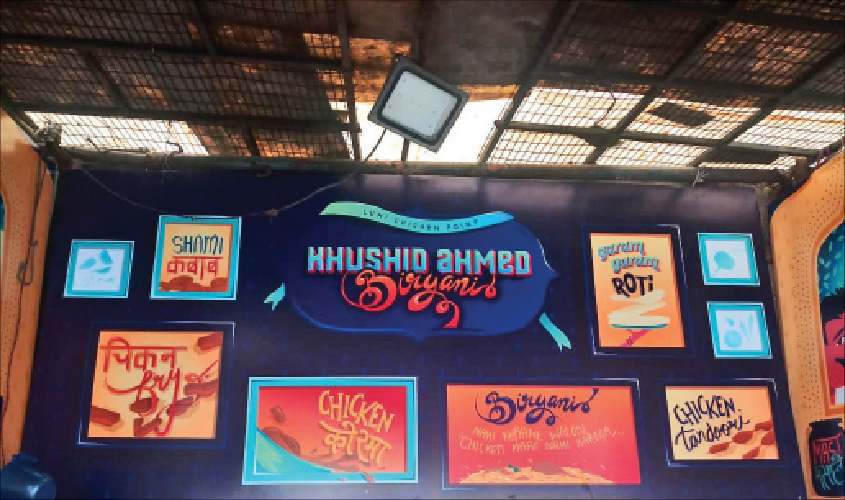kirana or neighbourhood retail stores, confectioneries and other small businesses continue to thrive in urban, semi-urban and rural areas across India. Despite the growth of swanky malls and one-stop shops, these small commercial establishments remain largely unaffected.
Recognising the importance of neighbourhood stores, Indianama, an art platform that curates and showcases works of artists across disciplines, has teamed up with graphic artists who will be helping small-business owners redesign their shops in Delhi localities like Karol Bagh, Saket, Mehrauli, Saidulajab, Chandni Chowk, Jama Masjid, and Chawri Bazaar among others. The photographs of the results would then be put on display at an exhibition to be hosted at Delhi’s Bikaner House from 8-25 August.
For the project, each designer was paired with a shop/business owner to conceptualise, design and initiate an identity system for them. This identity system, later, was implemented on-site, with due supervision by the designer, if and when required.
Indianama 2018 is organised by Kunel Gaur, who is also the founder and creative director at Animal, the creative agency behind the project. Gaur says, “The 2018 edition is about initiating a design dialogue that focuses on the most neglected demographics in the country. Some 71 graphic designers will come together to conceptualise identity systems for 71 small businesses/street-side shops—giving them access to good design. And giving us an opportunity to educate those who least understand it.”
To celebrate 71 years of the country’s Independence, Indianama has roped in 71 graphic designers for the project. “The designers were picked on the basis of their work’s relation to our concept this year, and whether a particular business fits the design sensibilities of those who were shortlisted. We had to make sure that the kind of work they have done in the past resonates with the business/store/small shop they have chosen to work on. This was important, considering the challenges we could face at the time of implementation,” Gaur informs Guardian 20.
Gaur and his team traversed the streets of Delhi, across markets in Karol bagh, Saidulajab, South Extension, Chandni Chowk—places where the real spirit of Delhi resides—to pick the shops that would be redesigned. “We wanted to get on board a variety of businesses—from food shops to tea stalls, to barber shops, to butchery to a repair shop and more,” he says.

Initially, some vendors, Gaur tells us, “were very reluctant” to participate. Business owners thought the Indianama team was approaching them because of vested interests. However, after several meetings, Gaur was able to convince them and the project is in full swing now.
Pragyesh Parmar, a graphic designer from Delhi, has redesigned Jain Electric Works, located at Main Bazaar, Delhi Gate. He says, “I tried to keep it simple and interesting while trying to make it convenient for the shop-owner. I picked up elements and designs that would go with the nature of his business—like the electrical motor, copper wire fitting, mechanic look and small patterns and structure of machines… I have also used the Devanagari script for humour and for the street audience.”
Deanne Fernandes has redone Khushid Ahmed Biryani shop in Pushp Vihar, Saket. On her design approach for this shop, the 30-year-old artist tells us, “The shop was very raw in appearance and had no identity of its own. The first step was to create a unique branding that describes the core of the Khushid Ahmed Biryani shop. I plan to revamp the inside walls of the shop, menu, packaging and stationery to give it a unique identity that brings out the flavours of Khushid Ahmed’s Biryani.”
Fernandes sourced her “design language” from local figures. She drew inspiration from one of the people running the shop, who came across to him as a charming person. “Hence,” she says, “the creatives had to be something that could bring a smile to people’s face with a hint of Indian mirch masala. Also, you will find a lot of Mughal touch in terms of motifs.”
The graphic designer duo Jaynish Shah and Neele Buddhadev, from Mumbai, worked on Saifi Shaan House in Mehrauli. Shah says, “I, along with my partner Neele, intended to give this shop a new identity, something that is lacking in the first place—to give it a visual design language that works in sync with their legacy, considering they have been here since three generations.”
Shah, who feels that Indianama 2018 is a great platform for both designers and vendors, says, “I come from a family that has had a small business and I value what it takes to run a business on the street. To do something and work along with them in my medium sounded like a great opportunity.”
Abhishek Choudhury, another designer, helped revamp the Vaishno Dhaba in Lado Sarai. He says, “The colours and design elements have been chosen after deliberation with Sajid, the shop-owner. We have revamped the signboard, menus and the soda fountain. We have also added new paper cups, flavour stickers, bottles, an LED sign and danglers.”

